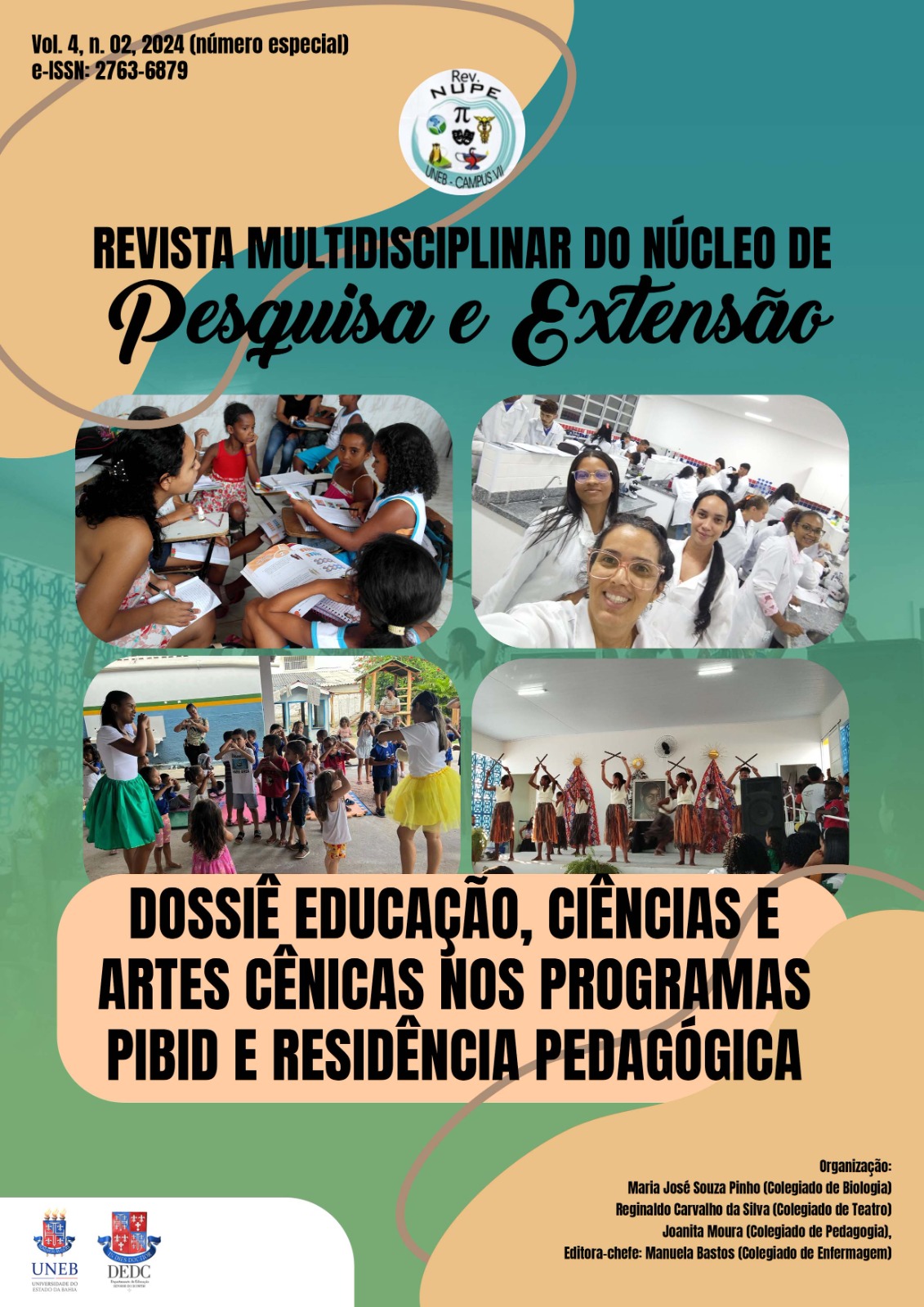Pedagogical Residency Program: the bridge that connects theory and practice
Keywords:
Teaching identity; Pedagogical Residency Program; Early Childhood Education.Abstract
This work is the result of my experiences as a resident in the Pedagogical Residency Program, of the Pedagogy course, at Escola Municipal Chapeuzinho Vermelho in Senhor do Bonfim - Bahia. Therefore, this main objective is to discuss the process of building my teaching identity as a resident of the Pedagogical Residency Program at an Early Childhood Education School. The project was entitled “The methodology of Pedagogical Projects as a way of starting teaching in Early Childhood Education and Early Years”. The activities were carried out between November 2022 and April 2024, with a workload of 8 hours per week, totaling 450 hours. Regarding the methodology for carrying out the project, it was organized as follows: writing pre-projects, observation, production of teaching resources and applications. The work is theoretically based on: Ghedin (2002), Tardif (2002), Pimenta and Lima (2004), Brasil (1998), Brasil (2009), Brasil (2018), CAPES (2020) among others. The Pedagogical Residency Program allowed me to understand in practice what it means to “be a teacher”. The contact between the resident and the educational environment promoted by the program becomes relevant as it brings the graduate student closer to the reality of the field in which he/she intends to work, leading him/her to reflect on aspects that involve the your future profession.
Downloads
References
ANTUNHA, E. L. Gonçalves. “Jogos sazonais” – coadjuvantes do amadurecimento das funções cerebrais. In: __. OLIVEIRA, Vera Barros de et al (Org.). O brincar e a criança do nascimento aos seus anos. 4. ed. Petropolis: Vozes, 2002. 184 p.
BRASIL. Constituição da República Federativa do Brasil. Brasília: MEC, 1988.
BRASIL. Lei de Diretrizes e Bases da Educação Nacional, LDB. 9394/1996. Secretaria de Educação Fundamental. Brasília: MEC, 2009.
BRASIL. Ministério da Educação. Base Nacional Comum Curricular. Brasília: MEC, 2018.
CAPES. Coordenação de Aperfeiçoamento de Pessoal de Nível Superior. Edital nº 1/2020. Programa de Residência Pedagógica. Brasília: Ministério da Educação, 2020. Disponível em: https://www.gov.br/capes/pt-br/centrais-de-conteudo/06012020-edital-1-2020-residencia-pedagogica-pdf. Acesso em: 23 de abril de 2024.
CASTELLAR, S. M. V.; SIQUEIRA, I. S. Da educação infantil ao ensino fundamental: Formação docente, inovação e aprendizagem significativa. 1ª ed. São Paulo: Cengage Learning, 2015.
FREIRE, P. Educação e mudança. Rio de Janeiro: Paz e Terra, 1979.
GHEDIN, E. Professor reflexivo: da alienação da técnica à autonomia da crítica. In: PIMENTA, S. G.; GHEDIN, E. (Orgs). Professor reflexivo no Brasil: gênese e crítica de um conceito. São Paulo: Cortez, 2002.
MORIN, E. Os sete saberes necessários à educação do futuro. São Paulo: Cortez, 2000.
NÓVOA, A. Professores: Imagens do futuro presente. Lisboa: Educa, 2009.
PIAGET, J. A formação do símbolo na criança: imitação, jogo e sonho, imagem e representação. Trad. Álvaro Cabral; Cristiano M. Oiticica. 2. ed. Rio de Janeiro: Zahar, 1962.
PIMENTA, S. G; LIMA, M. S. L. Estágio e Docência. São Paulo: Cortez, 2004.
SANTANA, D. R. Infância e Educação Infantil no Brasil: percursos e percalços. Enciclopédia Biosfera, Centro Científico Conhecer. Goiânia, v. 7, n. 12, 2011.
TARDIF, M. Saberes docentes e formação profissional. Petrópolis: Vozes, 2002.
Downloads
Published
How to Cite
Issue
Section
License
Copyright (c) 2024 Islla Bonfim

This work is licensed under a Creative Commons Attribution-NonCommercial-ShareAlike 4.0 International License.
Uma nova publicação de artigo anteriormente publicado na Revista Multidisciplinar do Núcleo de Pesquisa e Extensão (RevNUPE), fica sujeita à expressa menção da precedência de sua publicação neste periódico, seguindo as normas de referência. Autores que publicam na RevNUPE concordam com os seguintes termos:
-
O Conselho Editorial se reserva ao direito de efetuar, nos originais, alterações de ordem normativa, sintática, ortográfica e bibliográfica com vistas a manter o padrão culto da língua, respeitando, porém, o estilo dos autores. As provas finais poderão ou não ser enviadas aos autores.
-
Autores mantém os direitos autorais e concedem à revista o direito de primeira publicação, com o trabalho simultaneamente licenciado sob a Licença Creative Commons Attribution (CC BY-NC-SA).
-
Autores têm autorização para assumir contratos adicionais separadamente, para distribuição não-exclusiva da versão do trabalho publicada nesta revista, exemplo: publicar em repositório institucional ou como capítulo de livro, com reconhecimento de autoria e publicação inicial na RevNUPE.
-
Autores têm permissão e são estimulados a publicar e distribuir seu trabalho online — em repositórios institucionais, página pessoal, rede social ou demais sites de divulgação científica.

